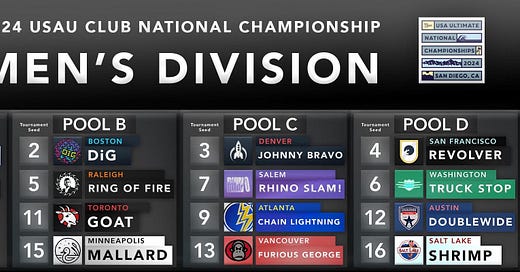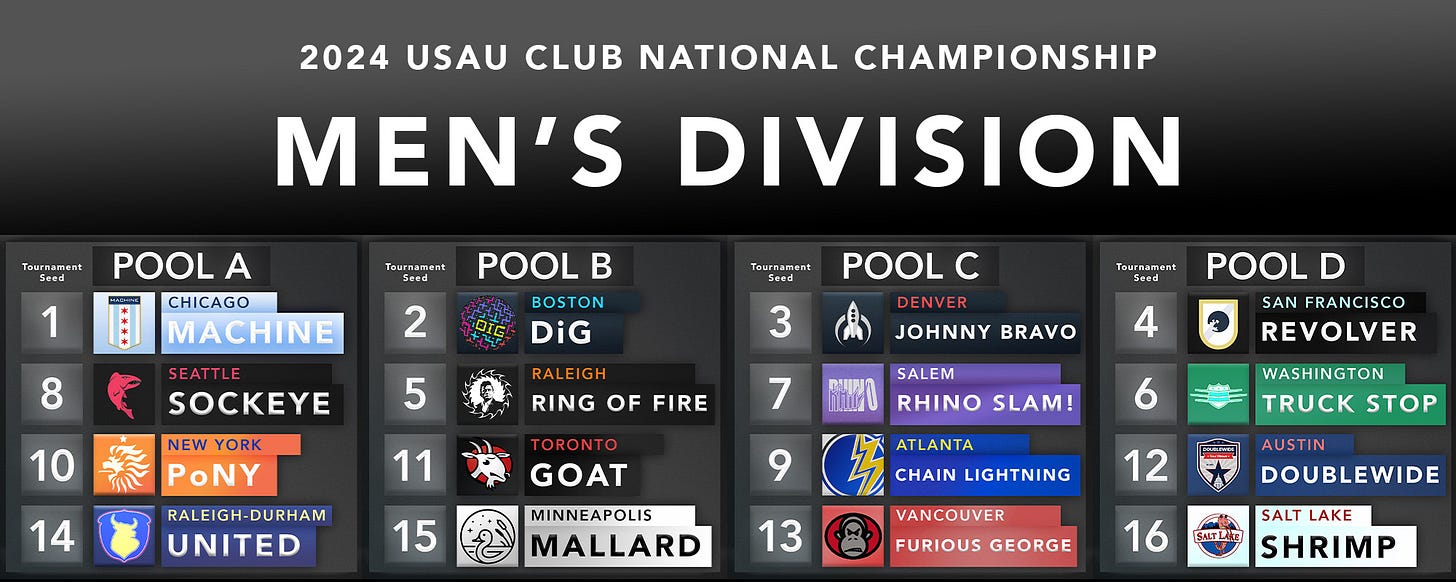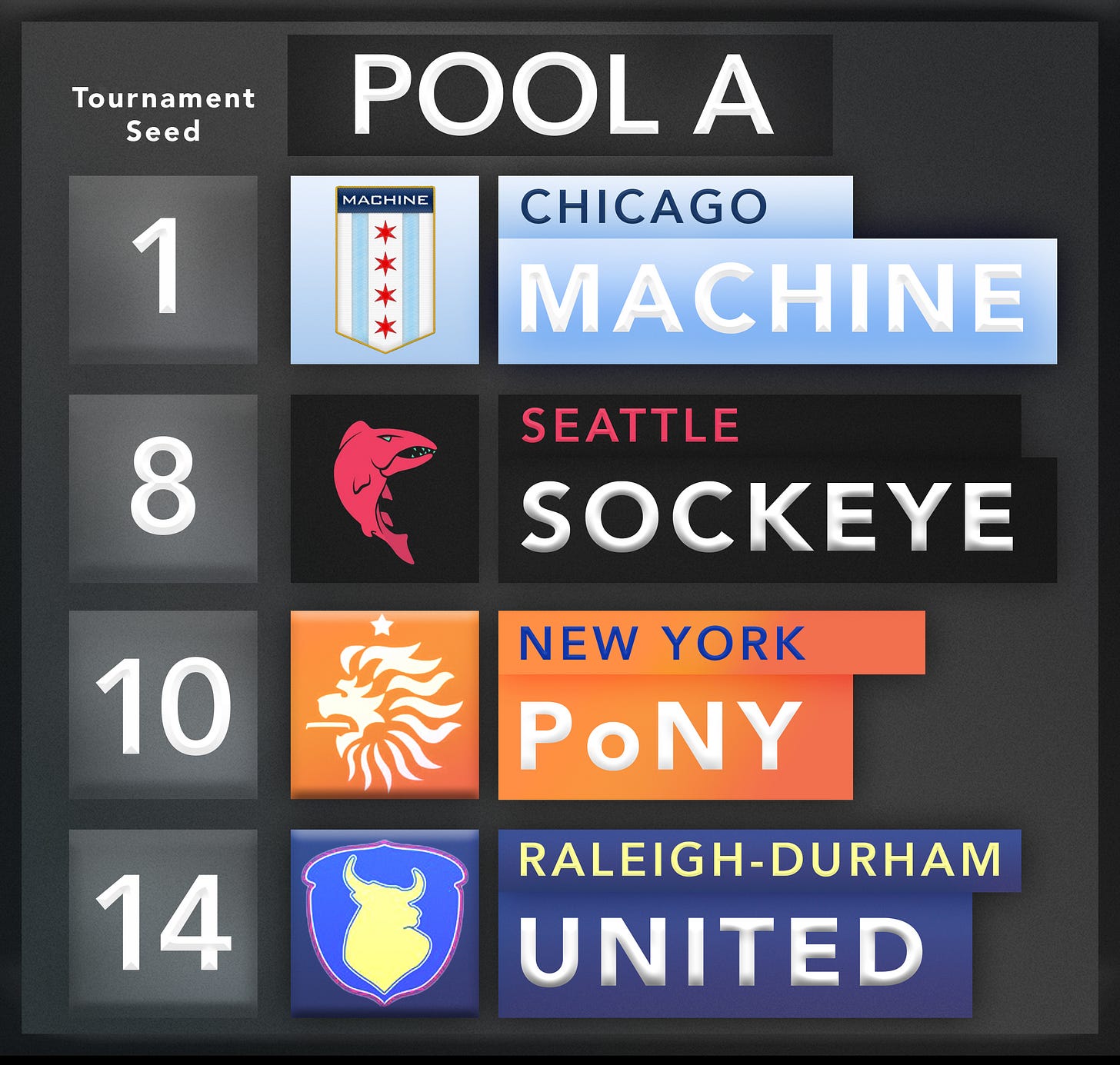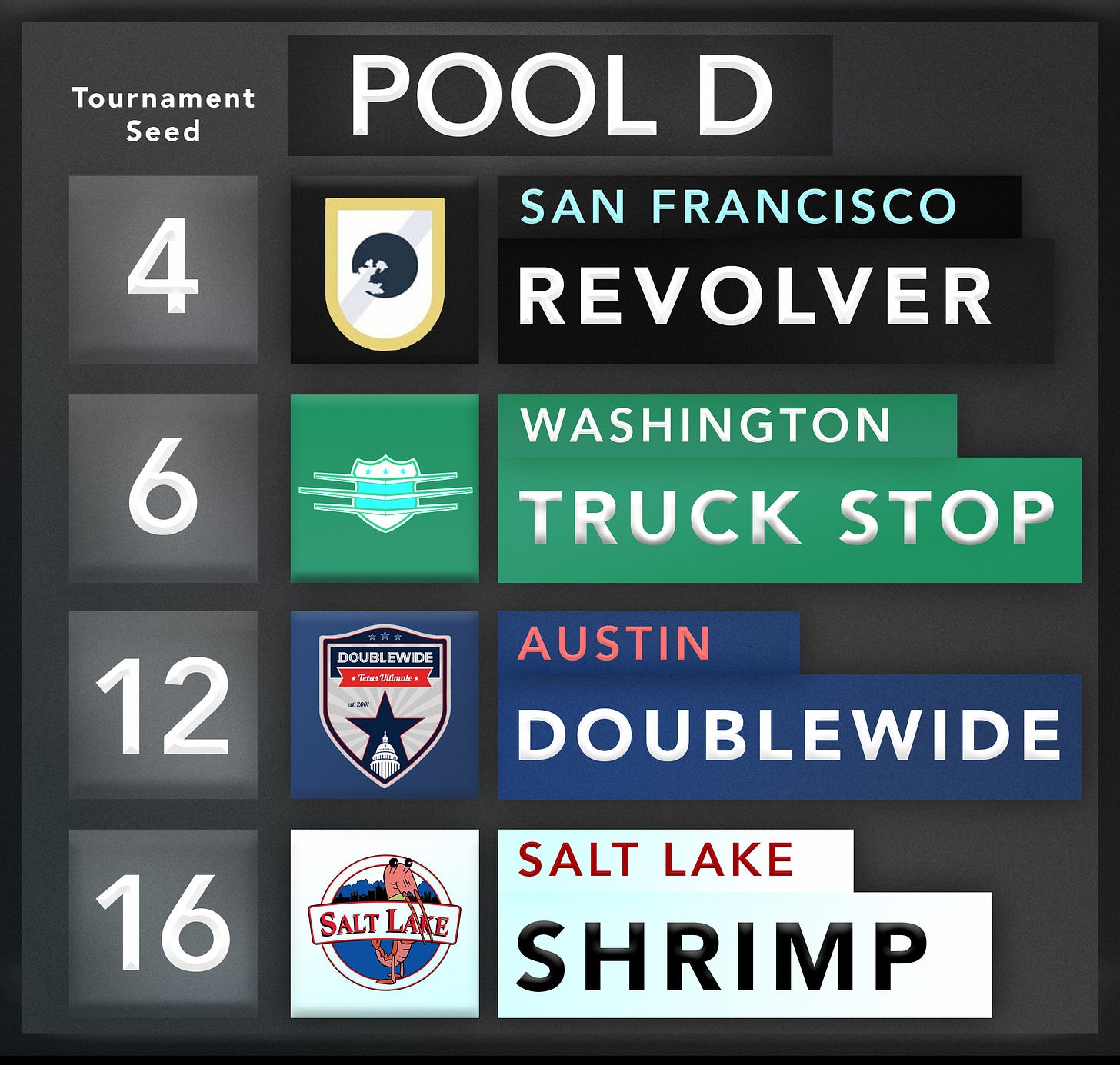Announcements:
There is lots of exciting new content coming your way! Women’s division preview coming out tomorrow (hopefully, possibly Thursday). Mixed division preview coming out Thursday (hopefully, possibly Friday/Saturday).
The Breakside also offers the option to upgrade your subscription to a paid version if you’d like to support my work or travel to cover tournaments financially. Covering nationals is/will be a lot of work! If you want to provide a little extra support, I would be incredibly grateful.
Check out the new Twitter account for updates and live coverage! Graphics courtesy of the amazing Griffin Stotland.
Thank you all, as always, for reading. Please share this with anyone else who may enjoy it, and remember to subscribe!
Men’s Division Preview
The sun is setting earlier, the air is (finally) getting crisper, and it’s finally fall, which means club nationals truly is just around the corner. It’s an exciting year for nationals in the men’s division. We are in an unprecedented era of parity in elite men’s ultimate, with defending champions Washington DC Truck Stop looking to become the first team to go back-to-back at USAU Club nationals since the early days of San Francisco Revolver’s dynasty in 2010-2011. Dating back to 2016, a different team (and city) has won each title.1
Despite many of those same programs making it to the semifinals quite consistently, it is still very notable that in a sport (and division) so marked by dynasties and repeat champs, this is the longest stretch of time without a repeat team or city since we started keeping track of nationals champions (1975, specifically, for how far back the records go).
Additionally, thanks to a new administrative rule, pools were not determined exclusively based on seeding this year. Instead, like in large soccer tournaments, they were based on a draw. You can watch the whole thing here, but all it means is that some pools may be a bit easier and some a little harder based on seeding and that a small element of randomness was added.
Pool A
#1 Chicago Machine (Great Lakes)
Pool A is an intriguing mix of teams where all four teams have to feel that prequarters is well within reach, let alone making the bracket proper. The number one overall seed, Chicago Machine, has to feel good about this pool draw, having already beaten New York PoNY and Raleigh-Durham United this season. They’ve only lost three times all year, once to #6 Truck Stop at the U.S. Open, then two times at an awkwardly timed Pro Championships, which took place the same weekend as many top club players were in Australia for the World Ultimate Championships. Last year’s runners-up have retained a lot of continuity and return to nationals this year even hungrier and more driven than last year. Is this their year? Well, their regular season sat them nicely at the top of division. It’s as good a year as any for the breakthrough. And they’d continue the pattern of no repeat champions.
#8 Seattle Sockeye (Northwest)
Last year saw a ten-year streak of nationals appearances for Seattle Sockeye abruptly come to a close after getting upset at regionals. In fairness, the program had been on a bit of a decline in its national-level results after winning it all in 2019, but they’ve righted the ship and retooled nicely this year. Sockeye had one of the best records in the regular season based on pure winning percentage, only losing four times all year, twice to regional rival #7 Portland Rhino Slam! and fellow west coast rivals SoCal Condors and #4 San Francisco Revolver. Notably, they crossed paths with RDU in August and won a relatively close game. This season is already better than last for Sockeye, but I think it’s fair to say that for a program and area with such a storied history and high expectations, it’ll likely take making it to the quarterfinals to feel fully “back.”
#10 New York PoNY (Northeast)
New York PoNY, like its UFA counterpart, the Empire, is in a transitional stage. When they won nationals in 2018, fully sunsetting the San Francisco Revolver dynasty, to me at least, it felt like we were on the cusp of a new dynasty—one that would harken back to the glory days of New York New York’s five consecutive championships and six-in-seven-years streak across the late ‘80s and early ‘90s. However, that didn’t materialize. They’ve been back to the semis and finals in they years since, but haven’t won again. They’ve lost some core names this year: Jeff Babbitt to regional rivals #2 Boston DiG, newly minted Southeast Regional legends Jack Williams (okay, he’s not new to the SE), and Sean Keegan, both to Wilmington FlyTrap. They have some nice wins this year (Truck Stop, Revolver) and some frustrating losses (Virginia Vault, most notably), as well as losses to both Pool A members Machine and RDU (again). They have an incredibly accomplished team, though. If anyone can pull off a run just when they’re starting to get overlooked, it’s this group.
#14 Raleigh-Durham United (Southeast)
Raleigh-Durham United have now made nationals for the second year in a row and are looking to solidify themselves as players on the national stage fully with a run in the bracket. Also, for the second year in a row, they find themselves in a pool at nationals with PoNY after beating them in the regular season. So, go figure. They’ve also played their entire pool already, for whatever that’s worth, going 1-2, beating PoNY but losing to Sockeye and Machine. It’s hard to compete with the top teams from an area when you are the second team in yours, but RDU has done a solid job of sticking close to higher-ranked teams this year. Their only real hiccups were a 13-9 loss to New York Blueprint (at the same tournament they’d beat PoNY at, ironically) and a later-avenged loss to Eugene Dark Star. Staying close is one thing. Winning close games against good teams is another thing entirely. I saw them get very close firsthand at Southeast Regionals in their semifinal, only to fade late. They’ll have to find another gear for late in close games as the underdog if they want to make it out of Pool A.
Pool B
#2 Boston DiG (Northeast)
As New York men’s ultimate takes a small step back, Boston men’s ultimate takes a step forward. It's a tale as old as time (or at least a tale 30 years old). In the years following Boston Ironside’s dissolution after the 2017 season2, DiG has filled that void as the undisputed top men’s team in Boston and has slowly been building each year. And just like their counterparts at the top of Pool A, the top seed in Pool B is out for revenge against the defending champs this year. Although it might be extra personal for DiG, after this strip call on universe point was overruled and called in favor of Truck Stop despite the video evidence supporting Boston’s initial call. Regardless of grudges from last year, the battle for the top spot in the pool, bye to the quarterfinals, and inside track DiG’s first semifinal appearance as a program will be tightly contested. DiG drew Raleigh Ring of Fire as the second seed in their pool, and the teams split their season series 1-1. They haven’t played since early August, though. DiG has already beaten regional rival and third seed in the pool, Toronto GOAT, further solidifying Pool B as a two-horse race for the top spot.
#5 Raleigh Ring of Fire (Southeast)
Despite my experience watching Ring of Fire at regionals being less inspiring than I was used to, it’s asking a lot for them to lose more than once in Pool B. As with DiG, the biggest question looks to be, who will win the rubber match between the two powerhouses and the pool? Leading up to their 2021 championship, Ring was a model of consistency, making the semifinals five years in a row before getting over the hump. And after a post-championship hiccup the next year, they were right back in the mix despite being seeded #8 last year. Their loss to #9 Atlanta Chain Lightning in the regional final should serve as a wake-up call for a group that generally turns it on when it matters most. Only time will tell if Ring can dial it all in for nationals. I see them as having one of the most significant gaps between their floor and ceiling finishes of any team in the division.
#11 Toronto GOAT (Northeast)
You’d be hard-pressed to find a team that worked harder than Toronto GOAT did to make it to nationals, winning back-to-back universe point games with their season on the line to secure the final Northeast men’s bid. Their reward: drawing the regional champion Boston DiG, who they just lost to, as well as Ring of Fire at the top of Pool B. They’ve only lost four games all season, which is good. However, it is slightly concerning that all four losses were the only four games they’ve played against fellow nationals-qualifiers, including the aforementioned #2 Boston DiG, #12 Austin Doublewide, and two losses to #10 PoNY. But…the flipside is that they took care of business, often in incredibly tight and high-pressure situations against everyone else, including an Amherst Sprout team that was hot on their tail for that final bid. Making it to prequarters looks very doable. Can they keep taking care of the games they’re supposed to win?
#15 Minneapolis Mallard (North Central)
The North Central was the weakest men’s division region in the country this year. Minneapolis Sub Zero earned the auto-bid but was outside the top 16 after the regular season. Cross-town rivals #15 Minneapolis Mallard stole their bid, making them the only bid stealers in the men’s division. It’s also their first time qualifying as a program. Congrats! Like GOAT, they have also lost each game they played against a team that later qualified for nationals. Getting Ryan Osgar back playing ultimate in the North Central after some adventures on Ring and PoNY and stealing him from old team Sub Zero seems like a big win, and in one game sample sizes, anything can happen. No team in Pool B has seen Mallard yet this year as well. That lack of familiarity should work to their advantage. If they can start games hot, maybe a couple of favorites are scrambling to adjust before it’s too late.
Pool C
#3 Denver Johnny Bravo (South Central)
Welcome to Pool C, the hardest pool in the division (lowest average seed) and the pool where the most games have been played between its teams. South Central champions #3 Denver Johnny Bravo earned the privilege being in this pool with two other regional champions in #7 Portland Rhino Slam! and #9 Atlanta Chain Lightning. It’s going to be a bloodbath. The champs from 2022 will still be the favorites to take the pool, though, with an incredibly talented roster (hello and welcome to the team Lucky PuNCs legend Tobias Brooks) and on the back of a solid, if short (two regular season tournaments) regular season. They are also 1-0 against the pool, beating Chain back at Pro Champs in early September. Coming off a national championship and universe point loss in the semifinals in their last two appearances, it’s clear this core has more in them. The field is more open than it’s ever been, and the deck was stacked against them far more than it is now back in 2022 when they won it all. Why not again this year?
#7 Portland Rhino Slam! (Northwest)
Rhino Slam was flying high most of the year before a bonkers 1-5 weekend at Pro Champs, where their only win was over Truck Stop. Sure, they were a little undermanned (two people at WUCs as far as I can tell, but other teams had more people gone) and flew across the country to play, but that’s not inspiring. They righted the ship nicely at regionals, winning a very deep Northwest region over eternal rivals Sockeye. Being seeded #7 feels very reasonable because they’re another team with a wide range of possible outcomes at this tournament. They match up against Chain Lightning in round two of pool play, which will be a critical early test. They lost twice at Pro Champs to the team from Atlanta, and Chain will have only grown in confidence since then. That’s one game I already have my eye on watching in person, as it’ll say a lot about both teams and where Pool C could be headed.
#9 Atlanta Chain Lightning (Southeast)
Chain Lightning was one of the teams I was most impressed with at Southeast Regionals. Beating the two triangle teams back-to-back to win the region is impressive in its own right, but the way they did it is even more so. Holding their nerve and finding an extra gear in the semis against RDU, then maintaining that high level of play against a Ring team that had a much less taxing path to the finals than they did was incredibly impressive. All signs point to Chain Lightning peaking at the right time. Why are they seeded #9 then? Well…their early season was marred by some significantly less impressive results. Interestingly, they’ve played the whole pool already, and despite beating Rhino Slam! twice, they’ve lost to both Johnny Bravo and #13 Vancouver Furious George. Have Chain Lightning ironed out their early season duds completely?
Additionally, at higher levels, the impact of every game being a rematch is more likely to make them closer rather than blowouts. If Chain plays with the ice in their veins they had at regionals, they could win the pool. If they have an off day, they could get fourth.
#13 Vancouver Furious George (Northwest)
Vancouver Furious George finished third at Northwest regionals but still comfortably made nationals. That’s how impressively deep the Northwest was. They’re in a very interesting spot as a program, too. They’re two decades past an impressive three titles in four years but haven’t even made it back to the semis since 2006. And after missing out on even attending nationals for a few years, they’re back for the second year in a row. It looks like Furious George is slowly on the rise again. Also, having played a shorter regular season, it’s a little harder to project how they’ll do, as they had a not-so-good Pro-Elite Challenge West and a very good Elite-Select Challenge. In all likelihood, they’ll finish fourth in Pool C. However, that win earlier in the year against Chain sets up a very interesting situation where they will go into the game as an underdog despite already having beaten their opponents. They won’t need to find the belief in themselves to pull off a big upset they already have. Furious George might just be the best positioned fourth seed in any pool in this division.
Pool D
#4 San Francisco Revolver (Southwest)
Pool D, like Pool B, is quite top-heavy around the first two seeds, but what a matchup those seeds will give us. It’s also the easiest pool (highest average seed value) thanks to the draw placing the #12 and #16 seeds into the same pool, which does not happen under standard seeding. But, it is also the pool with the least contact between the teams in the regular season. In theory, #4 San Francisco Revolver are the primary beneficiaries of the “easy” pool, thanks to being the top seed. They’ve lost seven games this year, though, most notably going 2-4 at the U.S. Open.
Additionally, in a one-bid region, they beat SoCal Condors 10-6 in the game to go. So, not incredibly inspiring but not too concerning either. They have some big losses to the teams seeded above them as well, and they got a lot of big wins (including over Truck Stop) at a weird Pro Champs. I don’t know how much stock to put into. This could very well be the year Revolver returns to glory, but it may also be yet another year getting bounced in quarters or even earlier as the dynasty days drift even further into the rearview mirror.
#6 Washington DC Truck Stop (Mid-Atlantic)
Part of the reason I’ve been so reluctant to go deep into the results of Pro Champs is that #6 Washington DC Truck Stop was missing nearly a full line of players that weekend who were instead in Australia representing Team USA. They went 2-4 that weekend. They lost one other game the entire season, a universe point game earlier in the year to PoNY. So don’t be fooled. Despite being seeded sixth, the defending champs are the team to beat. Yes, Rowan McDonnell is gone. But as has been mentioned many times over by people who have watched more Truck Stop film than I, their offensive scheme and execution are second to none in the division right now. And they are staggeringly deep. The semifinals seem like a minimum expectation this year, and repeating as champions is a very real goal. But no one has done that since 2011. It’ll be a tall order.
#12 Austin Doublewide (South Central)
Based on seeding, #12 Austin Doublewide might be the biggest winners of the entire draw. Pulling the #16 seed as the #12 gives them their best shot at securing a spot in pre-quarters on paper. They’ve proved they can close games out against national-caliber teams, too, winning early in the season over RDU, GOAT, and Mallard. They are in a tier of the team, though, that tends to start to struggle when bumping up against the powerhouses of the division. They challenged themselves during the regular season and have a lot of experience against those kinds of teams to show for it, though, which is a bit of an anomaly for teams towards the bottom of the nationals seeding. Doublewide should be the favorite to beat #16 Salt Lake City Shrimp and make prequarters, but they will have to find a new level as a team to go much beyond there.
#16 Salt Lake City Shrimp (Northwest)
Behold: a masterclass in earning a bid. In just their second year as a program, #16 Salt Lake City Shrimp is at nationals. They lost just one game in the regular season, avoiding any and all possible chances of running into the teams in this field they’d be favored to lose to, and despite one early season hiccup, took care of business when they had to. Regionals was a little bumpier, losing to Dark Star and Furious George in close games, but they avenged the Dark Star loss on their way to claiming their place at nationals. As far as expectations go, I’d say there aren’t really any for better and for worse. It’s a special situation to be such a new team and program on the national stage, and as the lowest seed in the tournament, you go into every game as the underdog on paper. It’s a fun spot to be in. And every team who makes club nationals deserves it, so despite Pool D being “easier,” one misstep for any of the favorites, one game where you’re looking ahead to the next one already, and it could all come crashing back to Earth real quick.
About The Breakside
If you enjoyed my writing, please consider leaving a like or comment, subscribing, or sharing it with a friend. There is now a paid subscription option to support the journalism I do. Please consider helping out in that way too if you are willing and able.
This newsletter aims to tackle the gap in present coverage of ultimate as a sport. Commentary, analysis, and community are some of the guiding ideals behind the Breakside.
About the Author
My name is Noam Gumerman (he/him). I am from Chapel Hill, NC, and studied Journalism and American Studies at Brandeis University. I am a journalist by trade and have been playing ultimate for over half my life. I love nothing more than combining those two interests. Contact me for discussions, feedback, story suggestions, and more on Twitter (@noamgum/@breaksideulti now too!) or email (noamgumerman@gmail.com).
2016: Boston Ironside, 2017: San Francisco Revolver, 2018: New York PoNY, 2019: Seattle Sockeye, 2021: Raleigh Ring of Fire, 2022: Denver Johnny Bravo, 2023: Washington DC Truck Stop for those curious (2020 was canceled)
Fun fact: Ironside’s last ever game (as far as I can tell) was against DiG in a consolation round at 2017 nationals, which they won 15-12









